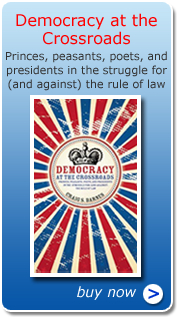There seems to be a constant series of examples in history that reflect what we are living through this week: from Psistratus in Athens to Caesar in Rome to the Duke of Lancaster in 15th-century England to Napoleon to Lenin and Hitler and now to Karl Rove, a multitude of fellows have harnessed populist outrage to their own carriage in order to seize power. That outrage, changing the metaphor, flows into the furious stream into which Boehner and McConnell and Palin launched their boats last night.
But something there is that doesn't love a Caesar, that turns the current to upend its own children and that brings the passionate opportunist down. Something happens to Leninism which of a sudden drowns in its own lies. Or something happens that flips the boat of Dick Cheney on his way to take Teheran.
We might therefore want to speculate about what are the forces that bring about such collapse, and in my mind there are two dependable forces working in our favor. Both are built into the nature of life on earth and are not ephemeral. Both are immutable and therefore reliable. Only the timing of when these factors will come into play is unknown. Only the year of the collapse of the Soviet Union was unknown; its eventual failure was always a certainty. Only the collapse of the myths justifying the Iraq invasion or the delusion of collateralized mortgages were unknown; their ultimate failure was inevitable.
The first dependable poison for the demagogue is that compassion is built into the genetic code. It comes with the species package. Darwinism and the ideologues of competition and unbridled power have carried the day for the Tea Party rhetorically, but the rhetoric cannot wipe out the genetic predisposition to care for one another, the genetic program that makes us cry when we see others cry, the urge to rise in the night to hold the wailing child, the massive outpourings of millions of dollars of aid to strangers in Bande Acheh or Haiti. We see on TV the scene of a soldier coming home, running across the gray tarmac into the arms of his waiting wife, children hugging his uniformed legs, and we weep with them and experience joy with them and it has nothing to do with politics. It has nothing to do with policy, even though we hate the war and the falsehoods that have brought us to that war. Our response is not out of the depths of ideology; it is out of the depths of humanity deeper than any learning or any matter of the mind.
The networks of dissidents with whom I was acquainted in the Soviet Union in the years before its fall were not united by ideology, or even idealism. They were united, as they huddled in apartments comforting each other with Pushkin and Shakespeare and memories of common distress, by an inextinguishable magnetic connection that comes from mutual suffering, a wellspring beyond theory or even description. Those were the waters of silent protest that ate away at the foundations of Soviet power like waves upon a sand castle, weakening the structure until it ultimately collapsed, and that is the wellspring that gave rise to the New Deal ending the Gilded Age, and that is the wellspring that gave rise to the War on Poverty, and that is the wellspring that gave rise, in a muted way, to health care reform. The wellspring is always there. We just don’t know when it will bubble to the surface.
The other factor that ultimately brings down abusive power is truth. Truth has its way with demagogues, leaches it way slowly through the fictions of the Catholic Church, or Marxist-Leninism, or Dick Cheney’s war. Truth does not sit well with illusion. After 2,000 years truth turns Jesus for more and more people into a remarkable human, but still human, and after 200 years we discover Jefferson’s Sally Hemmings, and after only about ten years we discover that Collateralized Debt Obligations are desperately unreliable. The torrent of popular rage gathers slowly at first in the valleys and across the fields before it hits the main stream, but when it gathers and focuses, the flood hits the rocks of truth and all the smoothness is gone, and the certainty is gone; the time for reason returns. Emergencies don't just provoke fear. As often as not they provoke the steely eye of reason.
Those two givens of human existence might give us hope even in these days of despair. Compassion and truth, like the gentle kiss and the sharpest stone, may yet work their effects to bring round the cycles again. We are headed into winter, maybe even a long and cold winter, but under the deepest snows lies the seed, as Judy Collins was wont to tell us, that in the springtime becomes the rose.
Hope in a Time of Sorrow
November 3, 2010
Category:
